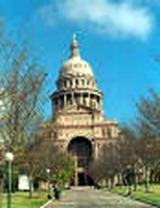Senate has own ideas for tax bill
March 15, 2005
Businesses would pay more, consumers less
Written by Janet Elliott, Houston Chronicle

AUSTIN - The Senate wants to pay for property tax relief through higher business taxes and lower sales taxes than those included in a $10.8 billion tax bill passed Tuesday by the House.
Lt. Gov. David Dewhurst told the Texas Daily Newspaper Association on Monday that the Senate didn't plan on adding more than one-half cent to the sales tax rate. He said the Senate also planned to provide a sales tax rebate for low-income Texans with a Lone Star Card.
House Bill 3, given final passage on a 73-68 vote, would raise the state sales tax by 1 percent. Texans living in Houston and most urban areas would pay a total sales tax of 9.25 percent.
The House also included an additional 3 percent tax on snack foods and soft drinks and a $1.01 per pack hike in cigarette taxes. Taxes on new cars also would be higher under HB 3, and sales tax would be applied for the first time to bottled water, car washes and vehicle repairs.
The Senate now will take up HB 3 and HB 2, an education bill that includes new school accountability measures and privatization of the lowest performing schools.
Both the House and Senate are committed to cutting school property taxes by one-third. However, the Senate wants to seek voter approval of a statewide property tax.
The House reduces but does not eliminate the current "Robin Hood" system under which wealthy districts share a portion of their revenue with poorer districts.
Dewhurst said the Senate will follow the outline for a school finance plan announced in January. That plan called for a broad business tax that would raise almost $5.5 billion a year.
The business tax passed by the House would raise about $3.5 billion a year. It allows businesses an option of paying under the current franchise tax or a new 1.15 percent tax on payroll. The franchise tax is based on 4.5 percent of net income or 0.25 percent of assets, whichever is greater.
The Senate has not explained how its business tax would work but said it would be universally applied at a low rate.
Alcohol taxes were off the table during the House debate, but are included in the Senate plan.
The Senate plan outlined in January allots nearly $4 billion in new money for public schools, $1 billion more than in the House proposal.
House Speaker Tom Craddick said he expects the Senate will make changes that will have to be worked out in a conference committee. He praised the plan to raise $5.4 billion a year over each year of the 2006-07 biennium to pay for the property tax cut.
"People are really excited about it across the state," he said.
Democrats and some Republicans have criticized the House plan for not spending any of the tax revenue to improve schools.
Eight Republicans joined Democrats in voting against HB 3 on final passage. Rep. Brian McCall, R-Plano, said he's concerned about the new taxes.
"Once taxes are on the books, the easiest thing to do is raise them," he said.
"I voted against HB 3 because it did not, in my opinion, fully fund the needs of public education," said Rep. Tommy Merritt, R-Longview.
Rep. Al Edwards, D-Houston, was the only Democrat to vote for the tax bill. He said he supports the bill because it brings most Texas businesses into the franchise tax system.
Under current law, more than 80 percent of businesses do not pay the franchise tax.
"I'm just glad to see us finally getting these businesses to pay their share," he said.
The Texas Association of Business, traditionally a critic of new business taxes, said Tuesday that the House plan is equitable to all employers.
"HB 3 is a collaborative effort that ensures that every employer in Texas pays its fair share and safeguards small businesses from being unfairly penalized," said Bill Hammond, president of the group.
![]()
![]()
Related Stories
![]()
Fair Use Notice
This site contains copyrighted material the use of which has not always been specifically authorized by the copyright owner. We are making such material available in our efforts to advance understanding of environmental, political, human rights, economic, democracy, scientific, and social justice issues, etc. We believe this constitutes a "fair use" of any such copyrighted material as provided for in section 107 of the US Copyright Law. In accordance with Title 17 U.S.C. Section 107, the material on this site is distributed without profit to those who have expressed a prior interest in receiving the included information for research and educational purposes. For more information go to: http://www.law.cornell.edu/uscode/17/107.shtml. If you wish to use copyrighted material from this site for purposes of your own that go beyond "fair use", you must obtain permission from the copyright owner.